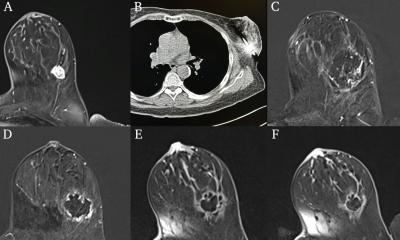Article • Osteoporosis
Vienna peaks in breast cancer research
‘Today Vienna is one of the top addresses with regard to breast cancer research,’ Professor Michael Gnant proudly reports – and he certainly knows what he is talking about.
Report: Michael Krassnitzer
These two meta-analyses will also redefine the standard treatment of breast cancer. In addition, they prove that, with our knowledge and our performance, we are at the forefront of international cancer research.
Prof. Michael Gnant
The surgeon is Director of the University Clinic for Surgery at the Vienna’s Medical University, Deputy Director of the University‘s Comprehensive Cancer Centre (CCC) and President of ABCSG, the Austrian Breast & Colorectal Cancer Study Group. During the past few months, all three institutions published stunning research results in The Lancet.
ABCSG-18 demonstrates that, in patients with early hormone-receptor positive breast cancer, the administration of the human monoclonal antibody denosumab, along with the standard endocrine therapy, can reduce by 50 percent therapy-induced osteoporosis, a long-term side effect. Subcutaneous administration of 60 mg denosumab, twice a year, basically halves the risk of fractures without side effects.
Moreover, the study results show that bone density in the spine increased by ten percent, in the hip by eight percent and in the femural neck by six percent. ‘These results are truly path-breaking and will certainly lead to changes in the current therapy regime,’ Professor Gnant underlines. ‘Two injections per year may spare many women severe suffering.’ Today, aromatase inhibitors are the treatment of choice for hormone receptor-positive breast cancer; they suppress the body’s natural oestrogen production and thus negatively impact on bone metabolism.
Two further studies showed that adjuvant anti-hormone therapy as well as bisphosphonate therapy could reduce the recurrence rate and mortality of postmenopausal patients with hormone-dependent breast cancer.
The first of these meta-analyses compared the efficacy of adjuvant aromatase inhibitors and tamoxifen. Aromatase inhibitors are administered to suppress the production of oestrogen, which promotes tumour cell growth in hormone-dependent breast cancer, while tamoxifen blocks the oestrogen receptors on the surface of cancer cells which prompt these cells to grow.
Results: post tumour surgery aromatase inhibitor therapy is superior to tamoxifen therapy. Compared to tamoxifen alone, aromatase inhibitor therapy reduces the risk of recurrence by one third. Moreover, figures indicate that a five-year aromatase inhibitor therapy reduces mortality by 15 percent compared to tamoxifen therapy.

Bisphosphonates are being used to counteract the osteoporosis risk associated with anti-hormone treatment of breast cancer. The second meta-analysis co-conducted at CCC Vienna confirmed the efficacy of bisphosphonates over a period of two to five years post-surgery in postmenopausal breast cancer patients since the occurrence of bone metastases was reduced by 28 percent and breast cancer mortality was reduced by 18 percent. In pre-menopausal breast cancer patients no positive effect could be identified.
‘These two meta-analyses will also redefine the standard treatment of breast cancer. In addition, they prove that, with our knowledge and our performance, we are at the forefront of international cancer research,’ Professor Gnant happily concludes.
The top performance does not go unrecognised: ABCSG will play a crucial role in the new PALLAS study, which seeks a new strategy for follow-up treatment of female as well as male breast cancer patients. Worldwide around 4,600 breast cancer patients at 500 centres are expected to participate in the study and ABCSG will coordinate the international – i.e. non-US – part of the study with 2,300 patients. Professor Gnant is understandably pleased: ‘For a small country, such as Austria, that’s quite remarkable.’
The study looks at patients diagnosed with a stage II or III hormone-dependent breast cancer without HER2 characteristics. After the standard initial therapy (surgery, radiation and chemo therapy) they receive the usual anti-hormone therapy over a period of two years to block metastases or an additional agent: palbociclib. This substance has been successfully used in he treatment of patients with breast carcinoma metastases (stage IV).
Profile:
Professor Michael Gnant directs the University Clinic for Surgery at Vienna’s Medical University and is Deputy Director of the University‘s Comprehensive Cancer Centre (CCC). The Vienna-born researcher also presides over ABCSG, the Austrian Breast & Colorectal Cancer Study Group. Additionally, he is visiting professor at the Mayo Clinic in Rochester, USA, and a board member of several national and international professional societies. His research focus is surgical oncology, particularly breast, colorectal and pancreatic. The professor is also interested in antibody immunotherapy, endocrine intervention, tumour dormancy, therapies targeting bones in order to halt tumour micro-metastases and therapies targeting pathways such as mTOR or CDK 4/6 inhibitors.
06.11.2016











